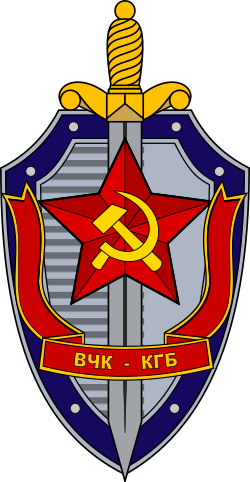#0excludeGlossary cannabis strain, KGB is an acronym for ‘Killer Green Buds.’
The Committee for State Security (Russian: Комитет государственной безопасности, romanised: Komitet gosudarstvennoy bezopasnosti, IPA: [kəmʲɪˈtʲed ɡəsʊˈdarstvʲɪn(ː)əj bʲɪzɐˈpasnəsʲtʲɪ]), abbreviated as KGB (Russian: КГБ, IPA: [ˌkɛɡɛˈbɛ]; ⓘ) was the main security agency of the Soviet Union from 1954 to 1991. It was the direct successor of preceding Soviet secret police agencies including the Cheka, OGPU, and NKVD. Attached to the Council of Ministers, it was the chief government agency of "union-republican jurisdiction", carrying out internal security, foreign intelligence, counter-intelligence and secret police functions. Similar agencies operated in each of the republics of the Soviet Union aside from the Russian SFSR, where the KGB was headquartered, with many associated ministries, state committees and state commissions.
| Комитет государственной безопасности (КГБ СССР) Komitet gosudarstvennoy bezopasnosti (KGB SSSR) | |
 | |
| Agency overview | |
|---|---|
| Formed | 13 March 1954 |
| Preceding agencies | |
| Dissolved | 3 December 1991 |
| Superseding agencies | |
| Type | State committee of union-republican jurisdiction |
| Jurisdiction |
|
| Headquarters | Lubyanka Building, 2 Bolshaya Lubyanka Street, Moscow, Soviet Union |
| Motto |
|
| Agency executive | |
| Child agencies |
|
The agency was a military service governed by army laws and regulations, in the same fashion as the Soviet Army or the MVD Internal Troops. While most of the KGB archives remain classified, two online documentary sources are available. Its main functions were foreign intelligence, counter-intelligence, operative-investigative activities, guarding the state border of the USSR, guarding the Soviet leadership, preserving the security of government communications as well as combating dissent and separatism within Soviet society.
On 3 December 1991, the KGB was officially dissolved. It was succeeded in Russia by the Foreign Intelligence Service (SVR) and what would later become the Federal Security Service (FSB). Following the 1991–1992 South Ossetia War, the self-proclaimed Republic of South Ossetia established its own KGB, keeping the unreformed name. In addition, Belarus established its successor to the KGB of the Byelorussian SSR in 1991, the Belarusian KGB, also keeping the unreformed name.
Translingual
Symbol
kgb
- (international standards) ISO 639-3 language code for Kawe.
See also
- Wiktionary’s coverage of Kawe terms





